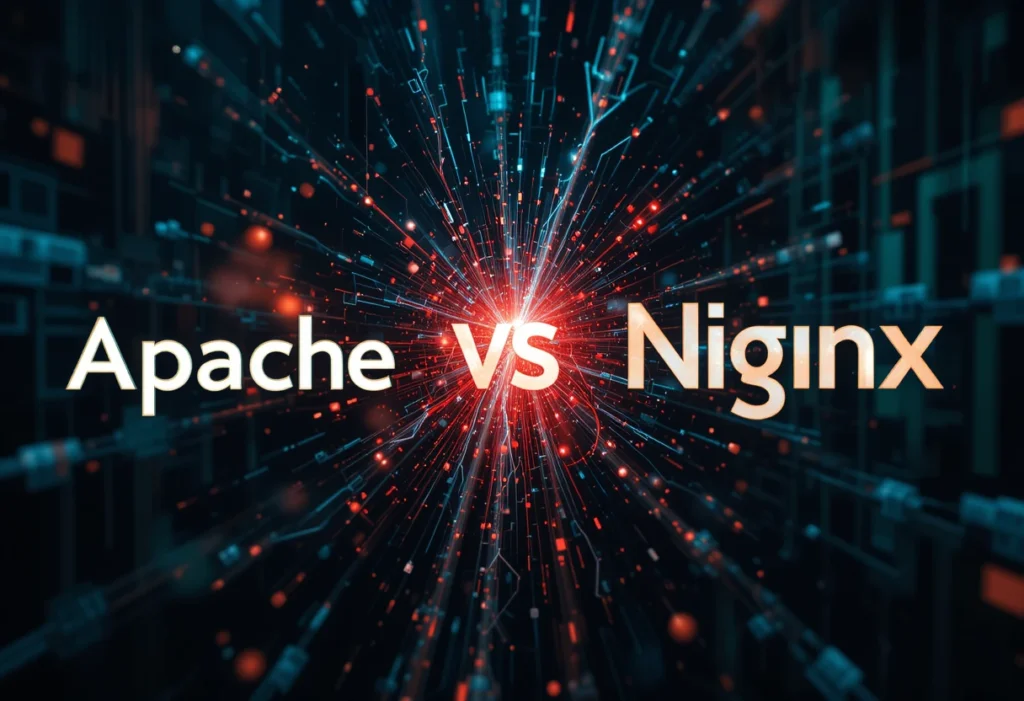When it comes to web servers, Apache and Nginx are the two dominant choices, powering a significant portion of websites worldwide. But when deciding between Nginx vs Apache, which one should you choose? Each has its strengths and weaknesses, and the right choice depends on your specific hosting needs, website traffic, and performance requirements.
In this guide, we will take a deep dive into Apache web server vs Nginx, comparing their architectures, performance, security, scalability, and use cases. We’ll also discuss how they can work together and when to choose one over the other.
What is a Web Server Why Does It Matter?
A web server is software that processes and delivers web pages to users over the internet. It handles requests from browsers, retrieves the necessary files, and sends them back to be displayed as a web page. The two most popular web servers today are Apache HTTP Server (Apache httpd) and Nginx server, both of which are widely used across different hosting environments.
A web server plays a critical role in website speed, reliability, and security. Choosing the right one can enhance performance and improve user experience, while the wrong one can cause slow loading times and security vulnerabilities.
Apache vs Nginx: An Overview
Apache Web Server: A Legacy Powerhouse
The Apache HTTP Server, often called Apache httpd, is an open-source web server developed by the Apache Software Foundation. It has been a leading web server since the mid-1990s and remains one of the most commonly used solutions today. Apache is known for its flexibility, extensive module support, and ease of use.
Pros of Apache:
- Supports dynamic module loading, allowing customization
- Well-documented and backed by a large community
- Compatible with .htaccess for easy directory-level configuration
- Works well with shared hosting environments
Cons of Apache:
- Thread-based processing can lead to performance issues under high traffic
- Consumes more memory compared to Nginx
- Slower than Nginx when handling static content
Nginx: A High-Performance Web Server
Nginx (pronounced “engine-x”) was developed to address Apache’s performance limitations, especially in handling large volumes of traffic. It follows an event-driven, asynchronous architecture, making it faster and more efficient than Apache in handling concurrent requests.
Pros of Nginx:
- Handles high-traffic loads efficiently
- Uses an event-driven model for better resource management
- Excellent for reverse proxying and load balancing
- Ideal for serving static content quickly
Cons of Nginx:
- Configuration is more complex compared to Apache
- Does not support .htaccess, requiring centralized configuration
- Fewer modules compared to Apache
Key Differences: Nginx vs Apache

| Feature | Apache Web Server | Nginx Server |
| Architecture | Process-based | Event-driven |
| Static Content Handling | Slower | Faster |
| Dynamic Content Handling | Better with PHP | Requires external processors |
| Memory Usage | Higher | Lower |
| Configuration | Uses .htaccess | Centralized configuration |
| Load Balancing | Basic support | Built-in advanced support |
| Best For | Shared hosting, .htaccess users | High-traffic sites, performance-focused hosting |
Apache vs Nginx: Performance Comparison
1. Connection Handling Architecture
Apache uses a process-driven model, where each connection requires a separate thread or process. This means higher memory usage under heavy loads.
Nginx, on the other hand, is event-driven and asynchronous, allowing it to handle thousands of connections with minimal resource consumption. This makes Nginx the superior choice for high-traffic websites.
2. Static vs. Dynamic Content Performance
When serving static files like images, HTML, and CSS, Nginx is significantly faster than Apache. This is because Nginx can serve static files directly from memory without involving external processes.
However, Apache has an advantage when it comes to dynamic content like PHP applications. Since Apache can process PHP within its server, it eliminates the need for an external PHP processor, which Nginx requires.
3. Security Features
Both Apache and Nginx offer strong security features, but there are some differences:
- Apache supports mod_security, a widely used security module for filtering malicious requests.
- Nginx, being more lightweight, has fewer built-in security modules but benefits from a simpler attack surface.
4. Configuration and Customization
Apache allows users to configure settings on a per-directory basis using .htaccess files. This is a major advantage for shared hosting environments, where users need to make adjustments without accessing the main server configuration.
Nginx does not support .htaccess and requires a centralized configuration file, which can be a disadvantage for some users but results in better performance and security.
When to Use Apache vs Nginx?
When to Choose Apache:
✅ If you rely on .htaccess for directory-level configurations
✅ If you run a shared hosting environment
✅ If your website is dynamic and uses PHP-heavy applications
When to Choose Nginx:
✅ If you need better performance for static content
✅ If your website handles high traffic loads
✅ If you need a reverse proxy and load balancing solution
Using Apache and Nginx Together
Did you know you can run Apache and Nginx together? Many high-traffic websites use Nginx as a reverse proxy in front of Apache. This setup allows:
- Nginx to handle static files efficiently
- Apache to manage dynamic content processing
- Improved performance and load balancing
Final Thoughts: Nginx vs Apache – Which Web Server is Best?
Both Apache and Nginx are excellent web servers, but they serve different purposes. If you’re hosting a small to medium-sized website with dynamic content, Apache might be the better choice. But if you need high performance, scalability, and efficiency, Nginx is the superior option.
Quick Takeaways:
- Choose Apache if you need .htaccess support and built-in PHP processing.
- Choose Nginx if you need speed, scalability, and efficient resource handling.
- Use both if you want the best of both worlds by leveraging Nginx as a reverse proxy.
By understanding the differences between Apache and Nginx, you can make an informed decision based on your website’s needs and traffic levels.
Frequently Asked Questions (FAQs)
1. Which web server is better for SEO: Apache or Nginx?
Both Apache and Nginx perform well for SEO, but Nginx’s faster page load times can positively impact SEO rankings.
2. Can I switch from Apache to Nginx easily?
Yes, but it requires some configuration changes. Many hosting providers offer tools to help with the transition.
3. What is the best web server for WordPress?
Nginx is often preferred for high-traffic WordPress sites due to its speed, but Apache is easier to configure with .htaccess.
4. Is there an alternative to Apache and Nginx?
Yes! CaddyServer and LiteSpeed are growing in popularity as alternatives. Caddy vs Nginx is a common comparison for users looking for automatic SSL and simpler configuration.



